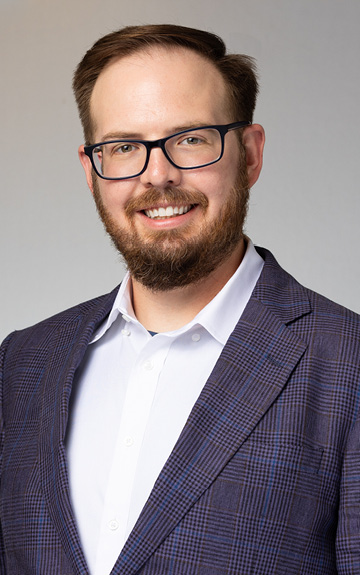Dylan Poulsen
- John W. Allender Associate Professor of Data Ethics • Director of the Data Science Innovation Lab

- 410-778-6352
- dpoulsen2FREEwashcoll
- Dunning N101D
Office Hours
Student Drop-In hours can be found on Canvas. You can book a virtual appointment with me at calendly.com/dpoulsen2
Dylan Poulsen OrcIDWhen asked about their mathematics experience, a typical person will answer with a variation on "I hated math." They often loved mathematics at a young age, but later on reached a singular point of struggle, causing the person to decide that they were not a "math person." From then on, mathematics was merely a requirement keeping the person from where they wanted to be. Dr. Poulsen works with many students who have this experience. In a gallery walk he does on the first day of class every semester, many of the students he works with have a similar mathematical biography. Many of the students are taking the class for distribution of for their major, and use words such as "hate," "struggle,'' and "fear" to describe mathematics. They believe that their mathematical abilities, for the most part, are set in stone. This is indicative of a "fixed mindset." This mindset often arises from the right-or-wrong nature of early mathematics courses; when you are wrong, it feels like a value judgment. The fixed mindset can also be found in students coming in with a strong mathematics background, where students view their mathematical abilities fixed as strong. When they begin to struggle as mathematics becomes more creative and less formulaic, some students will not challenge themselves, since a negative outcome can shatter their self-confidence and their notion of self as the "smart one." Alongside the individual course learning objectives, his main goal is to change ``fixed mindsets'' to ``growth mindsets,'' the mindset that abilities can be developed through hard work.
Education
- Ph.D., Mathematics, Baylor University, 2015
- B.A., Mathematics, University of Puget Sound, 2010
Academic Expertise
- Mathematics
- Data Science
- Recreational Mathematics
- Mathematics Education
To achieve his course objectives, Dr. Poulsen reads and enacts the best practices in mathematics and data science education. He creates a classroom culture around the concept of productive failure, that is, attempting something, not succeeding, reflecting on the attempt, and learning something from the experience. This allows students to engage freely in active learning in small groups, which has consistently been shown to be the most effective and equitable mode for learning mathematics, without fear of trying new ideas. The culture of productive failure extends to assessing students, where Dr. Poulsen uses standards-based grading which allows students to reassess a learning objective multiple times over a semester until they demonstrably understand it.
Additional Information
- 2023-02-27 | The Cromwell Award for Innovation in Teaching (The Barbara and George Cromwell Center for Teaching and Learning) Distinction
- 2018-06 to 2018-07 (Laboratoire d'Automatique, de Mécanique et d'Informatique Industrielles et Humaines) Invited position
- 10.1016/j.ejcon.2023.100808
- 10.1016/j.jfranklin.2019.07.011
- 10.1016/j.nahs.2019.02.008
- 10.1016/j.nahs.2018.08.001
Dr. Poulsen's primary area of research is in the field of dynamic equations on time scales, a generalization of differential equations. His research pushes the field into the realm of applied mathematics by answering questions inspired by engineering and data science problems. He is best known for the development of stochastic time scales, which gives an excellent modeling framework with which to understand engineering system which may suffer lag or delays in timing, such as a power grid or a group of robots acting in coordination. More recently, he has been developing a framework for Fourier analysis of time series data which is non-uniformly spaced in time, which is very common for geologic and astronomic data. His work, which includes 17 peer reviewed papers, has garnered international attention. He was invited to be a visiting research professor at a lab at the Universite Polytechnique, Hauts-de-France, during the summer of 2018, where he gave a public talk and collaborated with the faculty.
- MAT 111 - Differential Calculus
- MAT 112 - Integral Calculus
- MAT 210 - Multivariable Calculus
- MAT 194 - History of Mathematics (Special Topics)
- MAT 280 - Linear Algebra
- MAT 310 - Differential Equations
- MAT/CSI 320 - Probability
- MAT 370 - Real Analysis I
As an applied mathematician and data scientist, I have advised student capstones that use mathematics and data to understand how to:
- design a propeller
- make mathematical art
- model the spread and containment of a disease
- power an electric boat
- allocate solar power consumption
Work with me to help understand something you care about more deeply through a quantitative lens.